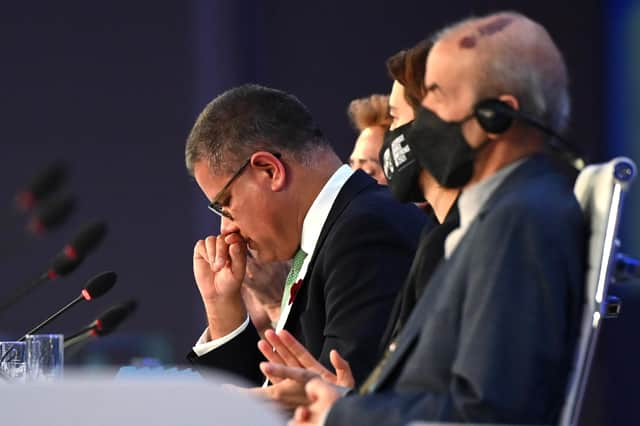COP26 summit: Glasgow Climate Pact was watered down so much that Big Oil will be breaking out the Champagne – Dr Richard Dixon


With so many caveats built in, no-one needs to actually phase out coal or stop subsidising fossil fuels.
The first draft of the Glasgow Climate Pact said that countries should phase out coal and fossil fuel subsidies (actually it only called upon them to “accelerate effort towards” this, since almost everything is voluntary).
Advertisement
Hide AdAdvertisement
Hide AdThis was widely welcomed because, for the first time in 26 years of climate talks, fossil fuels would actually get a mention in an overall agreement. Imagine spending a quarter of a century debating cancer before you get round to mentioning smoking.
Oh yes, we did do that, and for many of the same reasons of vested interests and industry dis-information campaigns. The largest country delegation at the COP were the just under 500 delegates from Brazil. The fossil fuel industry had even more people there. And their work was not yet done.
An overnight revision to the paper changed the wording to phasing out “unabated” coal and “inefficient” fossil fuel subsidies. What on Earth is an inefficient subsidy and who decides? The G8 group of rich countries made exactly this commitment in 2009 but fossil fuel subsidies continue at the rate of around half a trillion dollars a year. They must all be really efficient subsidies.
The UK tries to deny it has any fossil fuel subsidies, efficient or not, by redefining what a subsidy is. In reality, we subsidise the fossil fuel industry by around £13 billion, mostly through tax breaks which are so great that BP and Shell have paid no tax at all for the last three years.
In a three-hour session for countries to provide feedback, John Kerry, for the US, made it clear early on that they fully supported this text because subsidies must be a bad thing, but only if they are inefficient, and coal must go, but only if it is unabated. As ever, what the US says at COP, is where things usually end up.
Many countries and groups said they didn’t like the new additions to the text but South Africa said it didn’t go far enough and should recognise that some countries would have to go more slowly (even though no timescale was mentioned).
The draft that greeted delegates on Saturday morning had added “recognising the need for support towards a just transition”. Just transition is a concept to help countries exit fossil fuels but here it was being used as a delaying tactic. At a second session, India, China, Iran and Venezuela all said this still wasn’t good enough.
In the closing session, China again complained and India was allowed to change “phase out” to “phase down”.
Advertisement
Hide AdAdvertisement
Hide AdSurely the first mention of the villain of the piece is better than nothing? Probably not. Without the caveats, countries could have been questioned about whether their fossil fuel plans are consistent with trying to keep temperatures below 1,5C.
Now they can just say they are “accelerating efforts” to “phase down” “unabated” coal, and reduce “inefficient” subsidies. So that must be alright then.
Dr Richard Dixon is director of Friends of the Earth Scotland
A message from the Editor:
Thank you for reading this article. We're more reliant on your support than ever as the shift in consumer habits brought about by coronavirus impacts our advertisers.
If you haven't already, please consider supporting our trusted, fact-checked journalism by taking out a digital subscription.
Comments
Want to join the conversation? Please or to comment on this article.
